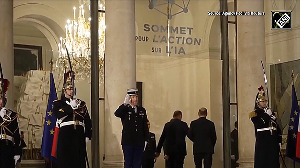The secretary-generals of both the Lok Sabha and the Rajya Sabha have decided not to respond to notices issued by Delhi high court on the plea of eight members of Parliament who have challenged their expulsion from Parliament in the cash-for-query scam.
This is in accordance with the December 23 decision of both Houses that expulsion of members was the exclusive jurisdiction of Parliament and "beyond the pale of judicial scrutiny", parliamentary sources said.
Justices Vijender Jain and Rakha Sharma of the Delhi high court Monday directed the central government, secretary general of Lok Sabha, secretary general of Rajya Sabha and the Election Commission to file their replies by February 16.
Lok Sabha Speaker Somnath Chatterjee, in an interview two days ago, maintained that the courts have no power to intervene in the matter. "Parliament had exclusive jurisdiction to decide on procedure and disciplinary matters in regard to its members," he added.
The expelled MPs who moved the plea included Chhattrapal Singh Lodha (Rajya Sabha), Suresh Chandel (Hamirpur), Pradeep Gandhi (Rajnandgaon), Yashwant G Mahajan (Jalgaon, Maharashtra) M K Anna Saheb Patil (Erandol), Chandra Pratap Singh (Sidhi) (all Bharatiya Janata Party); Rashtriya Janata Dal's Manoj Kumar (Palamu) and Congress' Ram Sevak Singh (Gwalior), (all Lok Sabha).
The MPs said they had been victimised by certain persons allegedly representing the "media" and thereafter, they were punished by the Parliament and the Union government merely on the basis of the media reports.
The persons behind the sting operation had acted with "mala fide and greedy intention to earn a fast buck, which was clear from the sale of the alleged footage to TV channel Aaj Tak for a declared consideration of Rs 57 lakh," their petition said.
The Lok Sabha and Rajya Sabha had acted in haste and expelled them without giving due consideration to the privileges enjoyed by the petitioners as MPs, it added.
The petitioners were entitled to the right to defend themselves by filing a written reply or being represented through a counsel on the allegations levelled against them, the MPs said.
The respondents had ignored the principles of law and natural justice while constituting the committee and calling on it to investigate the matter on the basis of the evidence furnished by the 'vested interests' -- who had been motivated by financial gains and cheap publicity, the petition said.
In all, 11 MPs were expelled from Parliament after 'Operation Duryodhan', telecast on a TV channel showed them allegedly accepting bribe from undercover reporters posing as non governmental organisation representatives, to ask questions in the House.






 © 2025
© 2025